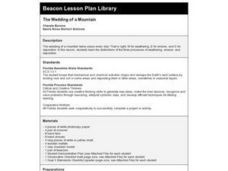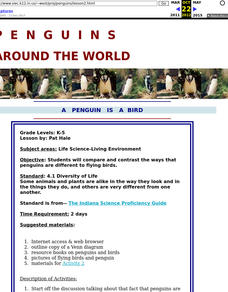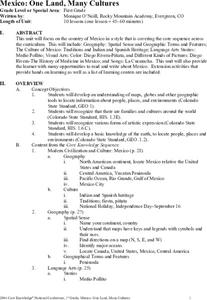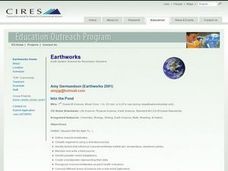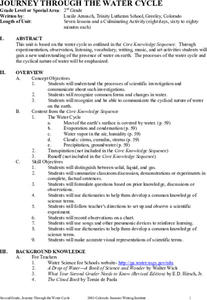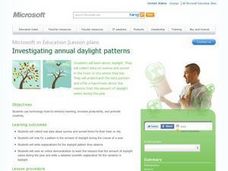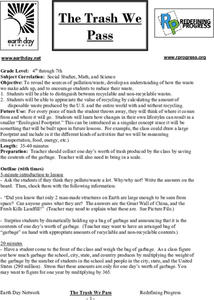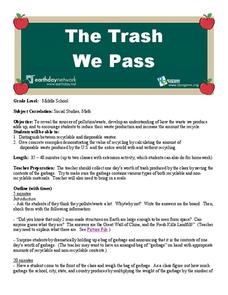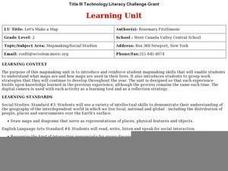Curated OER
Dreaming of Gardens
Students demonstrate ways to be an environmental philanthropist. For this philanthropy lesson, students read The Gardener and Just a Dream and compare the two books. Students discuss ways the characters demonstrated environmental...
Curated OER
How Do You Define Spring?
Students conduct surveys to determine when spring occurs in the minds of people in their area. They organize and interpret their data.
Curated OER
Summer Vocabulary
In this summer themed ESL worksheet, students will examine 20 summer themed vocabulary words and then match them with their definition.
Teacher Vision
The First Thanksgiving - Pilgrim Study Unit
Students explain the origins of Thanksgiving. As a class, they list all the meanings, stories, and images that come into their minds when they hear the word "Thanksgiving." After reading about Thanksgiving, pairs of students create 4...
Curated OER
The Wedding of a Mountain
Students examine the differences between weathering, erosion, and deposition as it pertains to mountains.
Curated OER
A Penguin is a Bird
Pupils compare and contrast the ways that penguins are different to flying birds.
Curated OER
Sea Turtle Savvy
Students explore sea turtles. They create paper plate sea turtles and brainstorm other organisms that live in the sea turtle's habitat. They role-play scenes from a nonfiction book, A Baby Sea Turtle's Journey. They play a game...
Curated OER
Mexico: One Land, Many Cultures
Students research and study the country of Mexico and complete a project about it. In this Mexico lesson plan, students research Mexico's geography, traditions, art, songs, stories, and legends that are native to Mexico.
Curated OER
Investigation 6 - Celestial Model
Third graders investigate why stars appear to move across the night sky.
Curated OER
Into the Pond
Seventh graders use a pond to explore macroinvertebrates and other organisms. They use a dichotomous key to classify the organisms and maintain a journal recording their findings.
Curated OER
Sunshine and Shadows
Students measure their shadows early in the morning, record direction of shadow, make marks in ground with chalk or tape, measure with ruler, and record results. Students repeat process at noon, and then later in afternoon. Students...
Curated OER
Journey Through the Water Cycle
Students canvass the water cycle in the seven lessons of this unit. The processes of the water cycle and the cyclical nature of water is emphasized inthis unit.
Curated OER
Cloud Databases
Learners complete a unit on clouds and a report about one type of cloud. They collect data through observation about different types of cloud cover and then create a spreadsheet to reflect their observations over a 2 week period.
Curated OER
Investigating daylight
students investigate a natural factor affecting their everyday lives: daylight. First, they collect data on sunrise and sunset in their hometown, create a Microsoft Office Excel chart to help them understand the data pattern, and offer a...
Curated OER
The Russian View of Territorial Encroachment
Twelfth graders produce a map illustrating the current NATO members, future nations, and nations that have applied for membership. They research current information regarding NATO, and the Russian viewpoint about the expansion of NATO....
Curated OER
Mining Reclamation and Cookies
Ninth graders are introduced to the process of mining. In groups, they use the internet to research the effect of mining on the environment. They work together to create their own make believe mining company and discover the process of...
Curated OER
THe Trash We Pass
Learners identify the sources of pollution and waste in their community. They examine the process of recycling and how to eliminate some of their family waste.
Curated OER
The Trash We Pass
Students engage in a study of trash and how it is disposed of in the environment. They also research the impact of recycling and its effects upon the disposal amounts. Students calculate the advantages of recycling using real world...
Curated OER
What Are the Good & Bad Aspects of Regional Shopping Centres?
Seventh graders study the impact of regional shopping centers and local ones, and create a TV/ video expressing the results of the research.
Curated OER
Let's Make a Map
Second graders draw maps of their playground, noting objects such as trees and play equipment. Working in groups, they make maps of different parts of the school and assemble them into a schoolwide map. They make maps on a field trip to...
Curated OER
Space - In Your Face or Not?
Second graders, in groups, examine how it doesn't matter if they can see the planets in the solar system or not--they're there.
Curated OER
Investigating Erosion in an Outdoor Classroom
First graders observe the effects of erosion. They work in groups to simulate erosion in a streambed, participate in class discussion, read books about fossils and rocks and then go on a fossil hunt.
Curated OER
Bats Migrate South
Students examine the life of bats in Illinois. Using the internet, they research the history of the bat in Illinois and describe the way they find prey by using echolocation. They report their findings to the class and answer any...
Curated OER
Life on the Border
Students discuss different types of boundaries. They research the United States/Mexico border and answer questions about their findings. They create collages, posters, or multimedia presentations showcasing various areas of concern...






